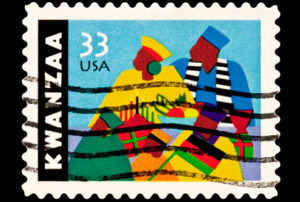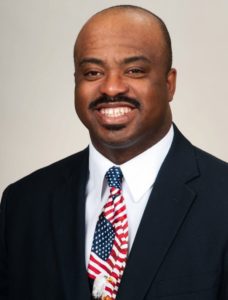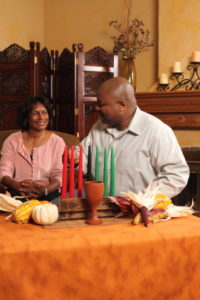27 Dec 2012 Kwanzaa Reinterpreted: Turning a Marxist Celebration into a Lesson in Conservative Values
 Right now – during the week beginning right after Christmas through New Year’s Day – some blacks and their liberal enablers celebrate Kwanzaa.
Right now – during the week beginning right after Christmas through New Year’s Day – some blacks and their liberal enablers celebrate Kwanzaa.
To most people, Kwanzaa would appear to be the observance of a traditional African celebration. That’s what the Kwanzaa kingpins want people to think. Kwanzaa’s origin really lies with the 71-year-old current chairman of the Cal State-Long Beach Africana Studies Department, Maulana Karenga.
Kwanzaa is originally the product of Karenga’s black nationalism – created back when he was involved with a group called United Slaves.
Karenga, quoted by the Washington Post in 1978, is reported as candidly saying about Kwanzaa:
People think it’s African. But it’s not. I wanted to give black people a holiday of their own. So I came up with Kwanzaa. I said it was African because you know black people in this country wouldn’t celebrate it if they knew it was American. Also, I put it around Christmas because I knew that’s when a lot of bloods [blacks] would be partying!
And there is no rush to deny the influence of Marxism in the creation of Kwanzaa.
Karenga’s obviously intended interpretation of Kwanzaa is a far cry from the solemn explanations found in the mainstream media these days.
Project 21 member Stacy Swimp has a different interpretation of Kwanzaa. Looking at it from a conservative perspective, Stacy sees the basic tenets of Kwanzaa that the radically race-conscious Karenga laid down less than 50 years ago during initial days of LBJ’s now-debilitating Great Society programs can now be seen to hold a meaning that is very conservative in nature.
member Stacy Swimp has a different interpretation of Kwanzaa. Looking at it from a conservative perspective, Stacy sees the basic tenets of Kwanzaa that the radically race-conscious Karenga laid down less than 50 years ago during initial days of LBJ’s now-debilitating Great Society programs can now be seen to hold a meaning that is very conservative in nature.
What Stacy sees in Kwanzaa won’t convince all conservatives to embrace the observance or even give it a second look. It doesn’t justify or endorse Kwanzaa’s radical leftist beginnings or apologize for the extremism of its tenured founder. But Stacy is taking a page out the leftist playbook in reinterpreting something and turning it against its creators.
Stacy wants to turn Kwanzaa into something that will instill conservative values.
Here’s what Stacy is thinking about Kwanzaa:
Starting on Dec. 26 through January 1 these days, many black Americans, predominantly-black institutions, the media and even some government (usually local) celebrate “Kwanzaa.”
Kwanzaa was founded by Maulana Karenga, now the chairman of the California State University at Long Beach’s Department of Africana Studies, in 1966. Karenga termed his creation of the new holiday “an audacious act of self-determination.”
Karenga, a noted atheist and Marxist, teaches that Kwanzaa is based on seven principles, which he calls the “Nguzo Saba” (the seven principles of African Heritage). He alleges this “is a communitarian African philosophy… the best of African thought and practice in constant exchange with the world.”
 According to Karenga’s book Kawaida Theory, the seven principles of Kwanzaa are supposed to be Swahili terms. Each of the seven days of Kwanzaa is dedicated to one of the principles:
According to Karenga’s book Kawaida Theory, the seven principles of Kwanzaa are supposed to be Swahili terms. Each of the seven days of Kwanzaa is dedicated to one of the principles:
- December 26 – Umoja (Unity): To strive for and to maintain unity in the family, community, nation and race.
- December 27 – Kujichagulia (Self-Determination): To define ourselves, name ourselves, create for ourselves and speak for ourselves.
- December 28 – Ujima (Collective Work and Responsibility): To build and maintain our community together and make our brothers’ and sisters’ problems our problems, and to solve them together.
- December 29 – Ujamaa (Cooperative Economics): To build and maintain our own stores, shops and other businesses and to profit from them together.
- December 30 – Nia (Purpose): To make our collective vocation the building and developing of our community in order to restore our people to their traditional greatness.
- December 31 – Kuumba (Creativity): To do always as much as we can, in the way we can, in order to leave our community more beautiful and beneficial than we inherited it.
- January 1 – Imani (Faith): To believe with all our hearts in God, our people, our parents, our teachers, our leaders and the righteousness and victory of our struggle.
I have seen many critics attack the celebration of Kwanzaa because its founder is atheist and a confirmed Marxist. Others condemn it for other reasons such as it detracts from the traditional holidays of the season and is separatist in nature.
I take a different approach.
I don’t have a problem with blacks who do choose to celebrate the principles of Kwanzaa. The main reason is because the principles are all quite conservative in nature. Despite this, I don’t know any black conservative who recognizes Kwanzaa as legitimate much less celebrates it.
What I’m saying is that – despite its firmly left-wing origins – Kwanzaa does appear to be something that liberals wouldn’t be promoting if they really took a close look at it. As it has entered the mainstream, the elements that Karenga included in his scheme to make it palatable to the masses at the time appear to have become the observance.
With Kwanzaa slipping out of the left’s control, it might be time for conservatives to help reinterpret it to reintroduce conservative values to the black community.
I believe that liberals who are now embracing Kwanzaa’s celebrated mainstream principles are actually deceiving themselves. The liberal agenda – with its devotion to big government and the welfare state – is a direct affront to each of the principles taught in the Kwanzaa celebration. Quite honestly, I would be very excited if liberals where to actually willing to put into practice these principles which they so superficially celebrate rather than just giving them lip service.
For example, if liberals are sincere in wanting to “maintain unity in the family, community, nation and race,” then why do they not fiercely oppose the Great Society policies created during the liberal Johnson Administration that have done more to break-up and break-down black families and divide and demean the black community and the race than chattel slavery ever could?

I have never met a black liberal who truly embraces the kind of self-determination that Kwanzaa’s tenets claims to seek to advance such as calling for one to define themselves and speak for themselves. Black liberals, to the contrary, are often indoctrinated by an ideology which makes it instinctive to malign, slander and assassinate any idea, definition or expression that does not espouse, protect and promote liberal policies.
Liberal black do not self-define as current Kwanzaa observances stress. They are defined by the definition given to them by the left, and they fight to promote those definitions or suffer the consequences from those who profess to be the black community’s leaders.
Liberal black Americans do not appear to believe in “collective work and responsibility” outside of a potential Marxist facilitation of bigger government. If they did, they would not spend their dollar bill outside of their communities after circulating it only one time (“dollar velocity”). Moreover, they would absolutely also support free market solutions in business, education and health care which would result in a stronger local economy. They don’t want to “solve problems together,” but want the government to solve their problems for them.
But that’s not being responsible.
When I was growing up, most of the local businesses were owned by local residents. That quickly changed as I reached my teens. Now, most of the businesses owned in predominantly-black neighborhoods are owned and maintained by people who do not live in the community. In many instances, they may not even be owned by Americans. Here again, there is a glaring hypocrisy.
Restoring our people to our “traditional greatness” is another Kwanzaa goal. I wonder if that includes the legacies of both African and African-Americans who espoused individual responsibility. Famous black abolitionist Frederick Douglass is credited with saying: “A man may not get all that he deserves, but he must work for all that he gets.” This is a direct indictment of Obama’s gutting of the welfare reform enacted by Bill Clinton, which strips Americans of the responsibility to work. There’s nothing great about that. There’s certainly nothing authentically black or African about that.
Predominantly-black urban communities can reasonably be described as war zones for all of the violence and drugs corrupting them. More citizens are murdered there than among our troops in Iraq and Afghanistan. More are killed there in individual shootings that in the headline-grabbing mass shootings. Although astronomical amounts of tax dollars in poverty funds have been allocated to these communities over the past 47 years, they are not more beautiful than before the so called “war on poverty.” They are, I say, worse than before the liberals began trying to fix them.
Finally, there is the so-called principle of faith in the modern interpretation of Kwanzaa. I cannot accept that liberals believe in God with all their hearts – not when they are cooperating with the genocide of millions of unborn black children, fighting against school choice for those allowed to live and championing regulations destined to deny our children of the opportunity to experience the kind of American exceptionalism that our nation’s Founding Fathers fought to guarantee us.
Black conservatives, on the other hand, live every single one of the Kwanzaa’s so-called principles (and do so on a regular basis – not just at the end of the year). The difference is that we based our principles on the work of God and the principles of the Constitution of the United States of American which transcend culture or color.
There is a perhaps unrecognized hypocrisy among those who claim to practice Kwanzaa. They are not Marxist revolutionaries. They are not even true racial separatists, but are more likely those seeking a racially singular celebration based on history rather than politics. But, while Karenga’s vision for Kwanzaa is a joke, in it lies the seeds of a conservative resurgence in the black community.
For those bold enough to take up the challenge, Kwanzaa can be used against the leftists who created it and the liberals who embrace it out of racial pandering.
Call into question the hypocrisy of those who clearly do not practice what they preach. Point out how adherence to the principles of Kwanzaa suggests one becomes more conservative rather than more liberal. A real celebration of black greatness, advancement and unity comes not through the government but despite it and without its involvement.



